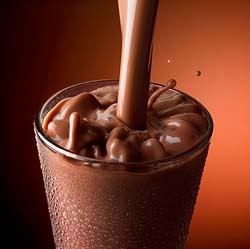Chocolate milk: Yummy, but not special.
 The ‘original’ chocolate milk study came out in 2006. And it seems like the whole chocolate milk thing just won’t die. Alas, document delivery has yet to deliver the article to my inbox yet (have I mentioned how much I love the Internet?), so I leapt forward in time to look at another study in the small puddle of chocolate milk studies.
The ‘original’ chocolate milk study came out in 2006. And it seems like the whole chocolate milk thing just won’t die. Alas, document delivery has yet to deliver the article to my inbox yet (have I mentioned how much I love the Internet?), so I leapt forward in time to look at another study in the small puddle of chocolate milk studies.
This study doesn’t quite get at the question, “How important, exactly, is post-workout nutrition?” but rather, “How does chocolate milk compare to other forms of post-workout nutrition?” Read More...
Fear of loss: How the fitness claims get you
 All through my undergraduate “career”, I worked in labs. Just as there are gym rats, I was a lab rat. Great experience for me. Okay pay for a student. But when I finished my undergrad, I already knew I was going to start my Masters in the fall. And at the time, I also felt that I had never really earned an honest dollar. I had never set foot outside the Ivory Tower and so I wanted to experience what a “joe job” might be like. My first choice was to be a waiter–pretty social, they seem to have a lot of fun for the most part, and the pay was probably better than my lab stipends. But in Toronto, getting a job as a waiter is tough competition. In the end, I lucked out, but there was a period of a month or so where I hadn’t found that job.
All through my undergraduate “career”, I worked in labs. Just as there are gym rats, I was a lab rat. Great experience for me. Okay pay for a student. But when I finished my undergrad, I already knew I was going to start my Masters in the fall. And at the time, I also felt that I had never really earned an honest dollar. I had never set foot outside the Ivory Tower and so I wanted to experience what a “joe job” might be like. My first choice was to be a waiter–pretty social, they seem to have a lot of fun for the most part, and the pay was probably better than my lab stipends. But in Toronto, getting a job as a waiter is tough competition. In the end, I lucked out, but there was a period of a month or so where I hadn’t found that job.
So what’s a 23 year old, freshly graduated biology major to do? Hit the want ads, of course. What happened next is a story unto itself, but the crux of the story is that I ended up doing a short stint as a door-to-door salesman with a franchise of one of the largest direct sales companies in the world. Read More...
Feel the PUMP! Um..that’s it.
First off, I LOVE how this article starts, “The use of nutritional supplements continues to increase with athletes and recreationally active trainees…” That’s right, you gym rats (me included); we’re not athletes. Quit pretending. It’s okay.
Snarkiness aside, I’ve been wanting to discuss nitric oxide or NO supplements (as well as pre-workout drinks) for a long time; but oddly enough, the literature was incredibly sparse on the topic in terms of studies involving humans and outcomes training individuals would be interested in. NO-type ingredients seem to be in everything, to the point where you don’t have to _decide_ to take an NO-related ingredient, you probably just are, particularly if you’re taking anything that is designed as a pre-workout supplement. In fact, it’s amazing that they can stuff more than 30 ingredients into a single pre-workout drink such that it will still fit into a couple of scoops. Read More...
If research isn’t the "real world", then what can it show us?
 When I was in physics class in my undergraduate degree, I remember doing an experiment to demonstrate the laws of momentum. I don’t remember the specifics of the experiment, but I do remember using an air-table (similar to an air hockey table, but smaller) and pucks (similar to air hockey pucks, but smaller) to demonstrate how conservation of momentum occurs in an almost frictionless environment.
When I was in physics class in my undergraduate degree, I remember doing an experiment to demonstrate the laws of momentum. I don’t remember the specifics of the experiment, but I do remember using an air-table (similar to an air hockey table, but smaller) and pucks (similar to air hockey pucks, but smaller) to demonstrate how conservation of momentum occurs in an almost frictionless environment.
Now, I don’t know about you, but I don’t live in a frictionless world. Those of you who live on air-hockey-table-like-environments, I can’t speak for you. And back then, I probably thought very similarly to the way some people think about research now: “If nothing on Earth is truly frictionless, short of air-hockey tables and mag-lev devices, why do we have to do this experiment?” The answer back then, was, “Because we’re telling you do it, so quit bitching already and push the friggin’ puck.” But I’ve tried that answer on people who ask, “We never use supplement X/training technique Y in tightly controlled situations, so how do the results of these studies help us?” and a) it doesn’t go over very well, and b) they’re really confused about some mysterious puck. Read More...
How much would you pay for 2 more reps at the end of your workout?
 The concept of progressive overload is a cornerstone to any weight-training program. Lifting more weight, or lifting the same weight for more reps is the goal that is theorized to produce muscle growth, or better performance (however you decide to measure that).
The concept of progressive overload is a cornerstone to any weight-training program. Lifting more weight, or lifting the same weight for more reps is the goal that is theorized to produce muscle growth, or better performance (however you decide to measure that).
Citrulline malate has been an ingredient in a multitude of sport supplements. It is theorized to work through 3 proposed mechanisms: 1) malate is proposed to accelerate ammonium clearance and citrulline is proposed to facilitate lactate metabolism (these effects however, were noted in microbial models, i.e. germs in a dish); 2) citrulline malate has been noted to protect against acidosis which is proposed to counter fatigue; 3) Citrulline malate is proposed to increase nitric oxide production, which has been shown to have many potentially physiologically beneficial effects (though none of these effects may affect the stuff you’re concerned about like muscle growth, fat loss, or any performance benefit). Read More...